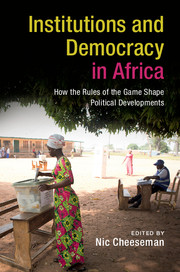Book contents
- Frontmatter
- Dedication
- Contents
- List of Figures
- List of Tables
- List of Contributors
- 1 Introduction: Understanding African Politics: Bringing the State Back In
- Part I Institutional Foundations
- 2 Institutional Legacies: Understanding Multiparty Politics in Historical Perspective
- 3 Property and Land Institutions: Origins, Variations and Political Effects
- 4 Financial Institutions: Economic Liberalisation, Credit and Opposition Party Successes
- Part II Law and Order
- Part III Elections, Parties and Political Competition
- Part IV Countervailing Institutions
- Index
- References
3 - Property and Land Institutions: Origins, Variations and Political Effects
from Part I - Institutional Foundations
Published online by Cambridge University Press: 05 February 2018
- Frontmatter
- Dedication
- Contents
- List of Figures
- List of Tables
- List of Contributors
- 1 Introduction: Understanding African Politics: Bringing the State Back In
- Part I Institutional Foundations
- 2 Institutional Legacies: Understanding Multiparty Politics in Historical Perspective
- 3 Property and Land Institutions: Origins, Variations and Political Effects
- 4 Financial Institutions: Economic Liberalisation, Credit and Opposition Party Successes
- Part II Law and Order
- Part III Elections, Parties and Political Competition
- Part IV Countervailing Institutions
- Index
- References
Summary
The idea of the state in sub-Saharan Africa as ‘institutionless’ underlies much contemporary theorising about African politics (Chapter 1, this volume). The term ‘neo-patrimonialism’ – widely employed in the comparative politics literature to describe African political systems – implies a lack of institutionalisation, and the centralisation of power in the hands of a supreme ruler and government through personalised, shifting networks. The counterpart of this idea is an ‘institutionless’ conceptualisation of society, and most importantly perhaps, of rural society, which accounts for 50–90 per cent of the total population of almost all African states. Once ‘institutionless Africa’ is accepted as descriptive of both state and society, both state and social structure fall out of the explanatory equation. Almost by definition, politics revolve around networks, identities, informalism, and trust and distrust.
This chapter reverses this image of structureless states and societies. It focuses on rural land tenure institutions and argues that they are the product of institution-building strategies of Africa's modern rulers, both colonial and postcolonial, extending the argument laid out in Boone (2014). Africa's rulers are seen here as strategic actors who have sought to impose political order in the countryside in order to govern, and to remain in power. As strategic actors, they have been subject to the disciplines of rule and revenue, power and resistance, and cost and benefit – both political and economic. Like all rulers, rulers in Africa have been constrained and incentivised to seek compliance from subjects and citizens, to build institutions to lower the costs of securing acquiescence, and to enhance the predictability of rule. They have pursued institution-building and state-building strategies that are shaped by the societies they seek to govern. Contemporary land tenure institutions are one outcome of this process.
The analysis of land institutions builds on strands of the New Institutional Economics (NIE) that have been influential in comparative politics since the 1990s. The first part of the chapter defines land tenure institutions as property institutions, arguing that they can be viewed in the abstract as outcomes of strategic interaction (asymmetrical bargaining) between rulers and rural societies. The second part uses this model to theorise about institutional origins, variations, and change in land tenure institutions in sub-Saharan Africa.
- Type
- Chapter
- Information
- Institutions and Democracy in AfricaHow the Rules of the Game Shape Political Developments, pp. 61 - 91Publisher: Cambridge University PressPrint publication year: 2018
References
- 2
- Cited by



